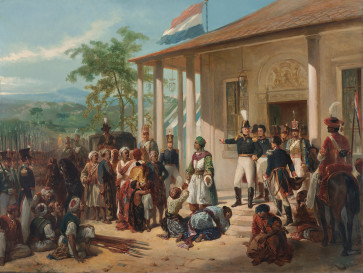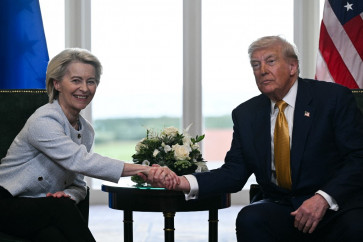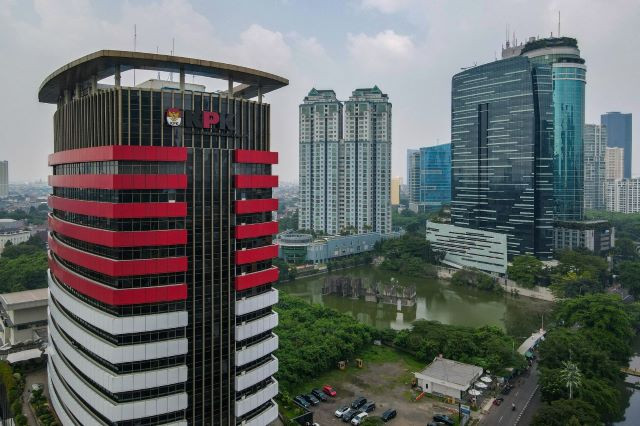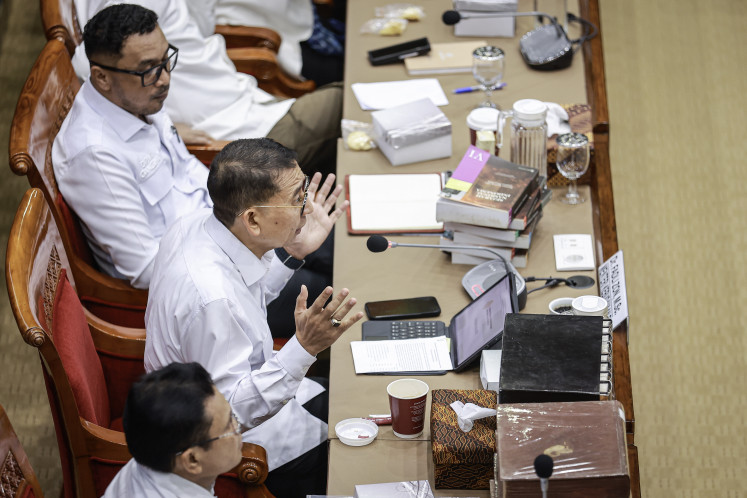Popular Reads
Top Results
Can't find what you're looking for?
View all search resultsPopular Reads
Top Results
Can't find what you're looking for?
View all search resultsView Point: Remembering Ramadhan, line by line
I read a funny-but-true story last week about Ie Seng Hoan, an 88 year-old Indonesian man who couldn’t remember why he was suing Citibank Singapore
Change text size
Gift Premium Articles
to Anyone
I
read a funny-but-true story last week about Ie Seng Hoan, an 88 year-old Indonesian man who couldn’t remember why he was suing Citibank Singapore. It turned out it was because he had suffered investment losses, but when Citibank’s lawyer asked Ie various details about the case, he couldn’t remember any of them. In fact, he couldn’t even remember what year it was. Oh dear! (flixya.com/blog/3528654/elderly-indonesian-vs-citibank-singapore-i-dont-know-why-im-suing).
But don’t laugh too loud. Many of us Muslims become like 88-year-old Ie when Ramadhan comes around each year. We forget why we’re doing it and continue to behave in ways we shouldn’t. As a devout Muslim friend of mine said, the fast becomes the end, not the means.
Other religions practice fasting as well — several Christian denominations, for example, as well as the Bahá’í, the Jains and the Jews. The Protestants don’t, because they see it as a purely external act, but for Hindus it is an integral part of their religion. Lay Buddhists also don’t fast, as they see it as a deviation from the Middle Path. Buddhist monks do though, on the days of the new and full moon, as a means of purification. Some Tibetan Buddhist monks even fast to aid yogic feats, like generating body heat. Oh baby!
There can also be health and medical reasons for fasting, to say nothing of that well-established political technique, the hunger strike. In any case, most people who fast usually have a clear reason for doing so – and they usually remember what it is. Not so for many of the 1.5 billion Muslims in the world, despite fasting being one of the five pillars of our religion. We seem to have suffered the fate of old man Ie: We’ve forgotten why we do it.
I came across an essay about Ramadhan by Tariq … err … Ramadan, the renowned Muslim author, scholar and activist (www.tariqramadan.com/lessons-from-ramadan)
According to Ramadhan (the man), the essence of Ramadhan (the month) is an opportunity to think about life, its meaning, our priorities and objectives. Not eating and drinking from sunrise to sundown isn’t easy, so there has to be a pretty important reason for it. Tariq says it’s a demanding physical effort to gain spiritual achievement and, indeed, find the divine spark in ourselves.
Divine spark?? You could have fooled me, given the way so many Muslims behave during Ramadhan! The reality is that some actually eat more during the fasting month. Sure, they starve during the day, but once it’s time to break the fast, they gorge on mounds of special foods served only during Ramadhan.
And like Christmas, Ramadhan and Idul Fitri have been sucked into the capitalistic consumer system. People spend more on food, clothes and other goods during this month than at other times of year, despite the fact prices go up early, often weeks beforehand. Why, Yayah, my cook, tells me that in the first week of the fasting month the price of chicken has already gone up a whopping 37 percent, from Rp 27,000 to Rp 37,000.
The result is that rather than people becoming more honest, Ramadhan can become a time for increased corruption. Makes sense really. How else do people make up for price rises and their suddenly swollen needs?
“To fast is to rediscover the meaning of mercy [rahma] and compassion”, Tariq says.
So how come Ahmadiyah groups in Indonesia start quivering as Ramadhan approaches? Their leaders say it is because this is the month when they most fear attacks by hardliners. And given that our courts recently gave killers who murdered three sect members very light sentences of just a few months, the survivors are right to be nervous. Ramadhan is a time for “purification”, so what better time in the sick minds of hardliners to clean out Ahmadis? What better way to make everything “pure” and “sacred” if not through “holy jihad” in the holy month? Last year Ahmadiyah homes and a mosque were destroyed by mobs during the fasting month – why should it be different now?
“Ramadhan is a month of peace [salam], inner peace as well as peace in the community … and a month [to] spread our love all around us”, Tariq says.
Well, there sure as hell ain’t a whole lot of lovin’ being spread in Afghanistan right now. Already on the second day of Ramadhan three suicide bombers have attacked a guesthouse used by foreigners in the northern province of Kunduz.
But then, historically, wars have always been fought during Ramadhan. Syria and Egypt launched their 1973 war on Israel to recapture territory lost in the 1967 war during the fasting month. In present-day Libya, neither the rebels nor the pro-Qaddafi forces are likely to lay their arms down and shower each other with hugs and kisses, even though they are all Muslims. In Syria, no one expects dictator Assad will go all lovey-dovey and embrace Muslim pro-democracy protestors either.
Back to old man Ie. Because he had “difficulty remembering almost everything,” the judge said his lawyer should take him through his affidavit, line by line.
I reckon that’s what we Muslims all need to do too. We should all jog our memories – and our hearts and souls — regarding the true meaning of Ramadhan, by going through the fundamental reasons for fasting, line by line.
The author (www.juliasuryakusuma.com) is the author of Jihad Julia.










